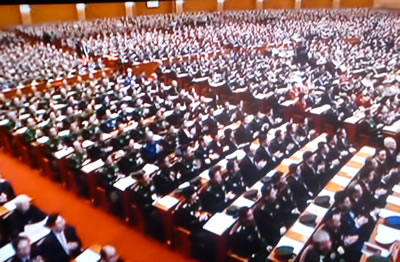90 Years of Communist China
Politics / China Jul 03, 2011 - 10:28 AM GMTBy: EconMatters
 The CPC (Communist Party of China) was founded on July 1, 1921 in Shanghai with a large working class support base. After the death of Dr. Sun Yat-sen (孫中山)--China's Founding Father (recognized by both Beijing and Taipei)--in 1925, a lengthy civil war soon ensued between the CPC and the ruling political party at the time--the Kuomintang (KMT or 國民黨).
The CPC (Communist Party of China) was founded on July 1, 1921 in Shanghai with a large working class support base. After the death of Dr. Sun Yat-sen (孫中山)--China's Founding Father (recognized by both Beijing and Taipei)--in 1925, a lengthy civil war soon ensued between the CPC and the ruling political party at the time--the Kuomintang (KMT or 國民黨).
 In between the Second Sino Japanese War and WWII, the CPC eventually seized control of the entire mainland China in 1949. The KMT, led by Chiang Kai-shek (蔣介石), who was a close ally of Dr. Sun Yat-sen, retreated to Taiwan and formed The Republic of China. The hostility, although greatly diminished with the passage of time, still remains between the two sides to this day.
In between the Second Sino Japanese War and WWII, the CPC eventually seized control of the entire mainland China in 1949. The KMT, led by Chiang Kai-shek (蔣介石), who was a close ally of Dr. Sun Yat-sen, retreated to Taiwan and formed The Republic of China. The hostility, although greatly diminished with the passage of time, still remains between the two sides to this day.
From 1966 through 1976, Mao Zedong (毛澤東), then Chairman of CPC, went on with his peasant revolution vision and practically brought the entire Mainland China into a "dark age" with the Cultural Revolution (文化大革命). (One of the reasons the term "Made in Taiwan" came a lot earlier than "Made in China.")
At the end of 1978, the CPC, under Deng Xiaoping (鄧小平), made a pivotal decision to shift the focus of Party and government to economic reform and open up its policy.
Since then, China and CPC has never looked back. The nation roared into the second largest economy in the world surpassing Japan in 2010 boasting a GDP of $5.879 trillion.
Throughout the past 60 years or so, China has never deviate much from socialism. The CPC is said to be the world's largest political party with over 80 million members, or about 6.0% of the total population of mainland China.
With rapid growth, cracks are starting to surface. Chief among them are rising price inflation, increasing civil unrest demanding higher wages, growing inequality of social and economic development between the rural and urban areas, overcapacity, and high debt leverage in local governments.
China has now entered into a new 12th Five-Year Plan (2011-2015) with targets such as achieving an average GDP growth of 7% per year, and creating more than 45 million jobs in urban areas. China is also set to undergo a major leadership turnover at the 18th CCP National Congress in fall 2012, which means the leadership transition will be the main focus of Beijing for the next two years.
So it is understandable that the recent messages from CPC party leaders have been centered on maintaining stability, and improving the economies of rural areas. If history is any indication, in China, stability means citizens need to have a satisfactory living standard through steady growth to fuel sufficient job creations.
It is too early to tell if CPC and Beijing would eventually rise or fall with this monumental challenge as it could take decades; nevertheless, it will no doubt have a profound impact on the rest of the world.
The video below is a good summary of the past and future challenges of China
Disclosure - No Positions
By EconMatters
The theory of quantum mechanics and Einstein’s theory of relativity (E=mc2) have taught us that matter (yin) and energy (yang) are inter-related and interdependent. This interconnectness of all things is the essense of the concept “yin-yang”, and Einstein’s fundamental equation: matter equals energy. The same theories may be applied to equities and commodity markets.
All things within the markets and macro-economy undergo constant change and transformation, and everything is interconnected. That’s why here at Economic Forecasts & Opinions, we focus on identifying the fundamental theories of cause and effect in the markets to help you achieve a great continuum of portfolio yin-yang equilibrium.
That's why, with a team of analysts, we at EconMatters focus on identifying the fundamental theories of cause and effect in the financial markets that matters to your portfolio.
© 2011 Copyright EconMatters - All Rights Reserved Disclaimer: The above is a matter of opinion provided for general information purposes only and is not intended as investment advice. Information and analysis above are derived from sources and utilising methods believed to be reliable, but we cannot accept responsibility for any losses you may incur as a result of this analysis. Individuals should consult with their personal financial advisors.
© 2005-2022 http://www.MarketOracle.co.uk - The Market Oracle is a FREE Daily Financial Markets Analysis & Forecasting online publication.




